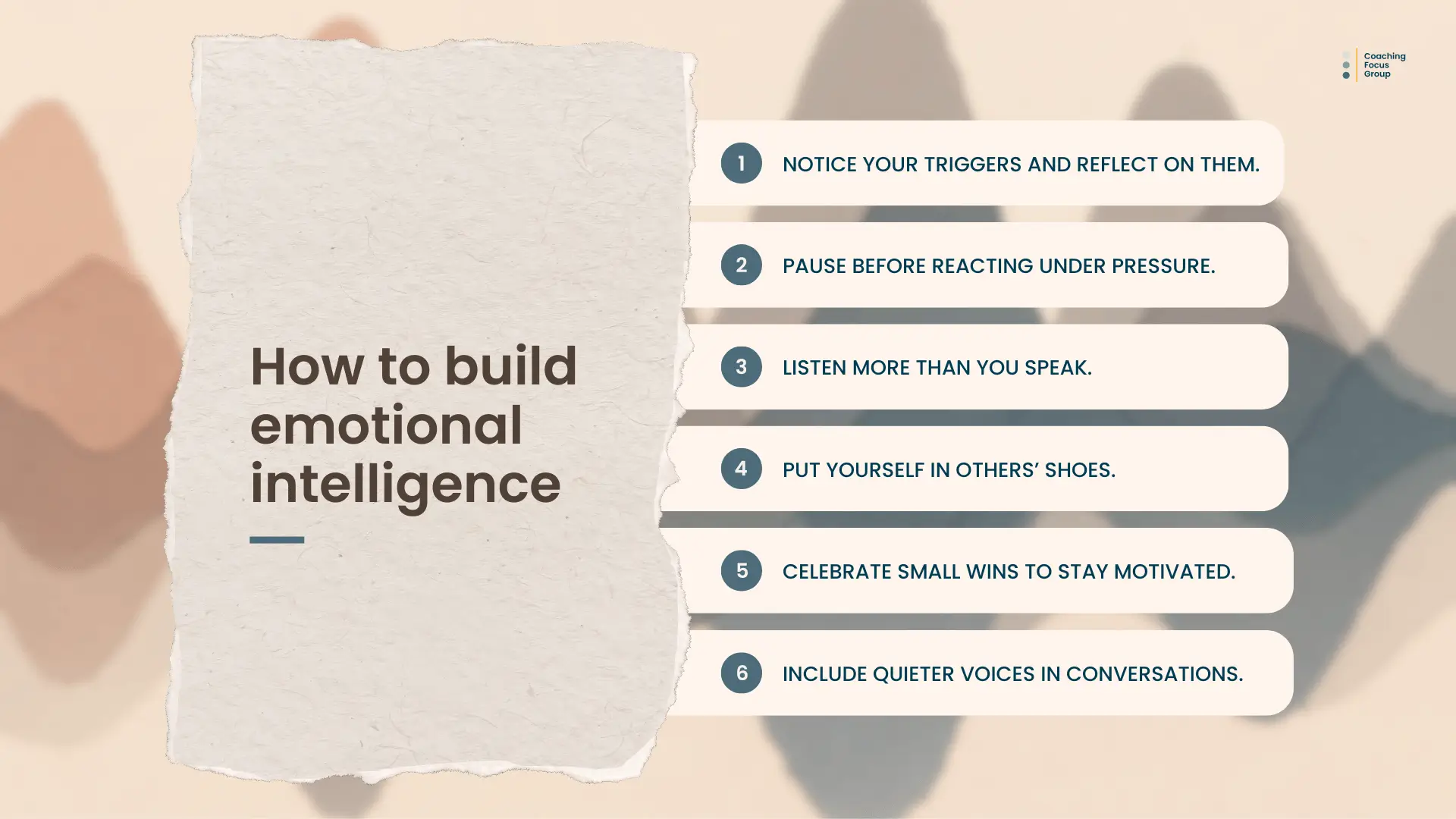Can Emotional Intelligence make me a better leader?

Can Emotional Intelligence Make Me a Better Leader?
Yes. emotional intelligence can make you a better leader. It helps you connect with people, build trust, and create teams that feel safe, motivated, and ready to perform.
Think great leadership is all about giving orders and calling the shots? Think again. In today’s ever-evolving workplace, the old command-and-control model just doesn’t cut it. It’s out of sync, outdated, and out of touch.
What’s replacing it? A more connected, collaborative, and human way of leading. And at the heart of that shift? Emotional intelligence.
Emotional intelligence (EQ) isn’t just a buzzword. It’s the backbone of human-centric leadership. It helps leaders forge deeper connections, tune into the needs of their people, and create environments where teams thrive, not just survive.
Why Does Emotional Intelligence Matter for Leaders?
When leaders lead with EQ, they’re able to:
- Decode team dynamics with empathy
- Make decisions with compassion, not just logic
- Create psychological safety that sparks innovation
- Empower voices that often go unheard
Think of the difference: a manager who cuts you off mid-sentence versus one who pauses and says, “Tell me more.” One shuts people down. The other draws people out. That’s emotional intelligence in action.
Instead of giving orders, emotionally intelligent leaders start real conversations. Instead of pushing outcomes, they nurture potential. And instead of simply managing people, they champion them.
Just last week, I was running coaching sessions with a leadership team in London. In a quiet moment between sessions, I noticed how differently the leaders in the room showed up. The ones who leaned into empathy, who paused to really listen, created instant trust. The ones who jumped straight to solutions often missed the heartbeat of the conversation. It was another reminder that emotional intelligence isn’t abstract. it’s what people feel in the moment.
What Does Human-Centric Leadership Look Like in Practice?
Human-centric leadership is about recognising that people aren’t machines. They’re messy, brilliant, emotional, and driven by values not just KPIs.
And when leaders understand this, powerful things happen. Performance soars. Trust deepens. Loyalty sticks.

Is Emotional Intelligence a Skill or a Trait?
Here’s the good news: EQ isn’t something you either “have or don’t have.” It’s a skill. One you can master. One you can model. And one that can transform not just how you lead, but how your team shows up every single day.
When emotional intelligence is woven into leadership, it creates ripple effects across an organisation. Teams feel seen, heard, and valued. Conflicts are resolved more constructively. Collaboration flows more freely. People take ownership because they feel safe enough to do so.
And this isn’t just good for people — it’s great for business. Studies show that companies led by emotionally intelligent leaders enjoy higher employee engagement, reduced turnover, and stronger performance. EQ becomes a strategic advantage, not just a soft skill.
How Does Emotional Intelligence Future-Proof Leadership?
The world of work is shifting fast. Hybrid teams. Digital transformation. Generational change. Empathy and adaptability are no longer optional — they’re non-negotiable.
Emotional intelligence equips leaders to navigate this uncertainty with confidence. To bring their people with them, not drag them along.
And it safeguards wellbeing. Leaders who practice EQ model healthy boundaries, foster balance, and prevent burnout. They build cultures where it’s okay to not be okay — and where people are supported to bounce back stronger.
How Can Leaders Develop Emotional Intelligence?
Emotional intelligence isn’t fixed — it’s a skill you can build. Start small with these daily practices:
- Notice your triggers and reflect on them.
- Pause before reacting under pressure.
- Listen more than you speak.
- Put yourself in others’ shoes.
- Celebrate small wins to stay motivated.
- Include quieter voices in conversations.

Even small shifts make a difference. Over time, they compound into a leadership style that builds trust, connection, and resilience.
Why Emotional Intelligence Could Be Your Smartest Leadership Move
Leadership is evolving. The future belongs to those who lead with heart, not just head. Who cultivate connection, not just compliance.
The question isn’t whether leaders need emotional intelligence — it’s whether they’re willing to develop it.
For me, that lesson started in the Royal Marines, where resilience was everything and leadership was tested every day. I saw first-hand that people only succeed when they’re empowered, encouraged, and trusted to grow. It’s a truth that has stayed with me through every coaching conversation since.
That’s why I believe emotional intelligence isn’t just a leadership advantage — it’s a necessity. If you’re ready to ditch command-and-control and step into a leadership style that’s authentic, inclusive, and impactful, start with emotional intelligence.
It could be the most human move you ever make. And the smartest.
FAQs About Emotional Intelligence in Leadership
What is emotional intelligence in leadership?
It’s the ability to recognise, understand, and manage your own emotions — and respond to the emotions of others. For leaders, that means leading with empathy, self-awareness, and trust.
Why does emotional intelligence matter for leaders?
Because people aren’t machines. Teams thrive when leaders connect on a human level, listen deeply, and create environments where people feel safe and valued. EQ drives higher engagement, loyalty, and performance.
Can I improve my emotional intelligence as a leader?
Yes. EQ is a skill, not a fixed trait. You can grow it through self-reflection, active listening, showing vulnerability, and practising empathy daily.
What are the key emotional intelligence skills every leader needs?
Self-awareness, self-regulation, empathy, motivation, and social skills. Together, they give leaders the tools to build trust and unlock potential.
Summary: Can Emotional Intelligence Make Me a Better Leader?
Yes. Emotional intelligence helps leaders connect with people, build trust, and create safe, motivated teams. It’s not a fixed trait — it’s a skill you can learn and improve. The stronger your EQ, the stronger your leadership impact.
Stay Informed
PS - we’re on a mission to help hundreds of HR leaders & professionals lead with greater clarity, confidence, and impact.
Sign up for Coaching Weekly today - it’s free for a limited time only: https://www.coaching-focus.com/coaching-weekly
Disclaimer
This article is AI-Assisted. Not AI-Written.
Trayton Vance
Trayton Vance is the Founder and Managing Director of Coaching Focus Group, one of the UK’s leading leadership coaching consultancies working with clients such as McDonalds, Beats by Dre, Paramount and many more.
Coaching Focus Group
Specialists in leadership coaching, workplace coaching programmes, and building coaching cultures that stick.
[FREE WEBINAR]
Feb 19 from 12pm to 1pm GMT

You might be interested in...


Employee Engagement Series












